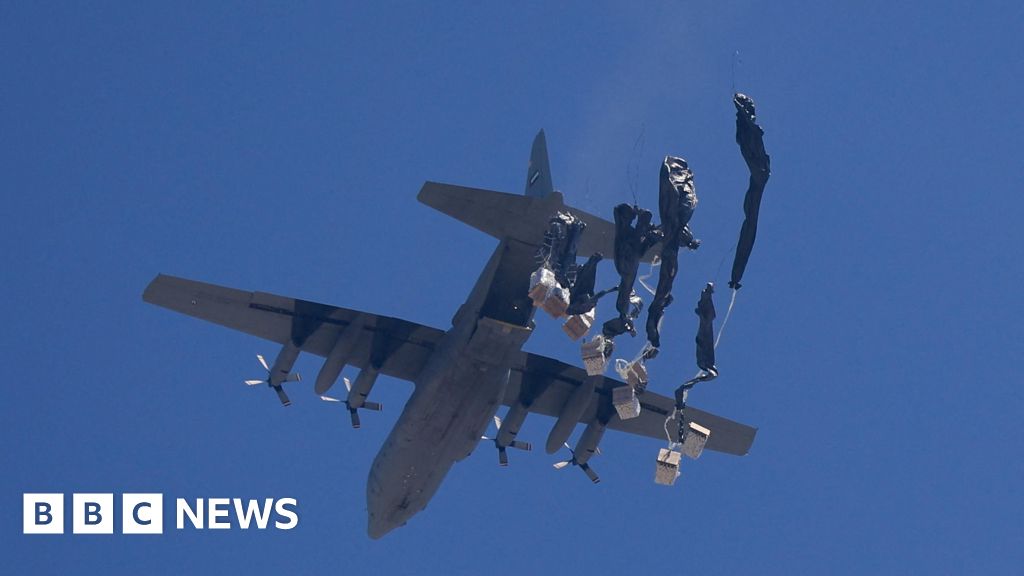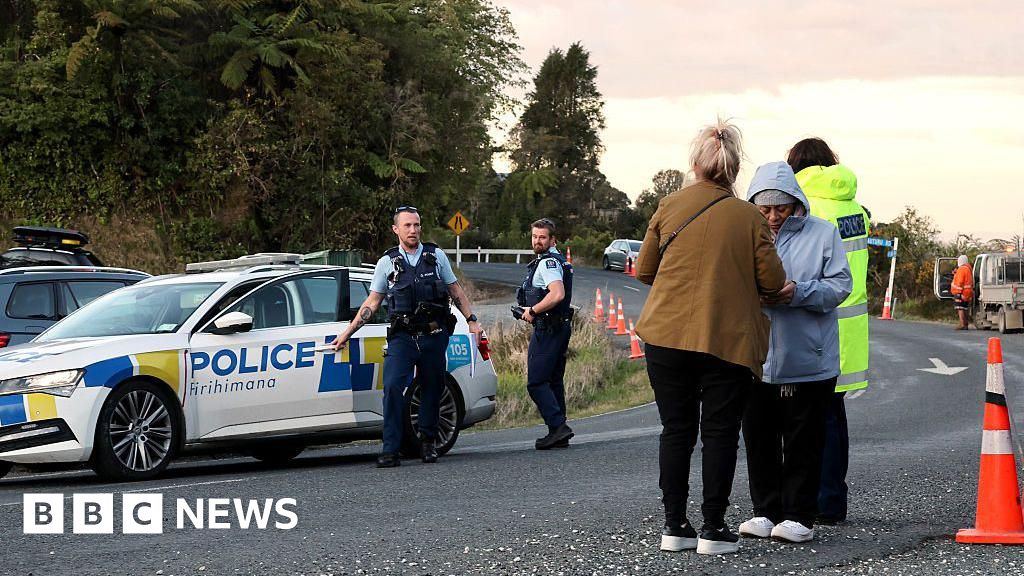
The World Health Organization has warned malnutrition has reached “alarming levels” in Gaza with rates on a “dangerous trajectory”, after aid airdrops resumed in the Strip.
Jordan and the UAE dropped aid into Gaza on Sunday after Israel began what it called a “tactical pause” in fighting.
Israel had said it would halt military operations for 10 hours a day in parts of Gaza and allow aid corridors for UN convoys, to “refute the false claim of intentional starvation”. Hamas accused it of “whitewashing its image before the world”.
Jordan’s military said its planes, working with the UAE, delivered 25 tonnes of aid in three drops. A lorry convoy also entered from Egypt, with another due from Jordan.
However, medics reported nine killed and 54 injured by Israeli fire near an aid convoy route in central Gaza. An airstrike also hit a residential block an hour after a pause came into effect on Saturday.
Local sources told the BBC that nine people were shot in the Netzarim Corridor along Salah al-Din Street in central Gaza, where many civilians had gathered in anticipation of incoming UN aid convoys. Victims were taken to al-Awda Hospital in Nuseirat, a medical official at the facility said.
The Israel Defense Forces (IDF) said its troops “fired warning shots” at a “gathering of suspects” approaching them. It said it was not aware of any casualties.
Meanwhile, BBC Verify geolocated an airstrike to Midhat Al-Wahidy Street in Al-Rimal district of western Gaza City – which Israel had designated an hour before as an area where operations would cease.
The verification was based on witness reports and two geolocated videos published earlier on Sunday. The IDF said it had checked the coordinates and it was not aware of a strike.
Food aid trucks arriving in the Strip on Sunday were rushed by desperate Palestinians who tried to grab bags of flour from near a food distribution point in Zikim, northern Gaza.
Israel has come under intense international pressure over recent weeks to allow aid into the territory it controls, amid reports of mass starvation.
The UN’s World Food Programme says a third of Gaza’s two million population do not eat for several days at a time, and a quarter are “enduring famine-like conditions”.
More than 100 people have been reported by the Hamas-run health ministry to have died from malnutrition in recent days. Hundreds have meanwhile been killed by gunfire as they attempted to get food from the limited number of distribution points run by the Israeli and US-backed Gaza Humanitarian Foundation (GHF).
The UK’s Foreign Secretary, David Lammy, said Israel’s concessions over the weekend alone would not address the full extent of hunger in Gaza.
“Whilst air drops will help to alleviate the worst of the suffering, land routes serve as the only viable and sustainable means of providing aid into Gaza,” he said in a statement.
“These measures must be fully implemented and further barriers on aid removed. The world is watching.”
Volker Türk, the UN high commissioner for human rights, called for more international pressure to end the war. Every day, he said, brought “more destruction, more killings, and the further dehumanisation of Palestinians”.
US President Donald Trump said he would be sending more aid to Gaza, but added this was “an international problem – it’s not a US problem”.
Residents of Gaza have cautiously welcomed reports of a temporary humanitarian pause allowing food and medicine to enter the besieged enclave.
“Of course I feel a bit of hope again, but also worried that starvation would continue once the pause is over,” Rasha Al-Sheikh Khalil, a mother of four in Gaza City, told the BBC.
Neveen Saleh, a mother of six, said her family hadn’t eaten “a single fresh fruit or vegetable in four months”.
“There’s no chicken, no meat, no eggs. All we have are canned foods that are often expired, and flour.”
Imad Kudaya, a local journalist in Gaza from al-Mawasi, in the south of the Strip, said most of the air drop packages “have fallen in demilitarised places where if you go there you will put yourself in a very big risk”.
“Those place are evacuated and under Israeli control – so it is risky.”
Even as air drops and convoys headed into Gaza, Israel’s prime minister promised his country would “continue to fight,”, saying: “We will continue to act until we achieve all of our war goals – until complete victory.”
During a visit to Ramon Air Force Base in the Negev Desert, Benjamin Netanyahu said Israel had always allowed aid into Gaza, and that the UN had unfairly blamed his government for the crisis.
“There are secure routes. There have always been, but today it’s official. There will be no more excuses,” he said.
The UN has rejected claims that there are no restrictions on getting aid in, and says Israel obstructs its ability to collect aid inside Gaza through bureaucratic obstacles.
On Sunday the UN’s World Food Programme said it welcomed Israel’s pause in military action in some parts of Gaza, but that there needs to be a “surge” in aid to reach hungry people without further delay.
Unicef called the aid boost an “opportunity to reverse this catastrophe”, but said there needed to be more humanitarian corridors to allow truck convoys move around.
Under the new measures announced on Saturday, Israel said it would suspend fighting in three populated areas of Gaza for 10 hours a day and open secure routes for aid delivery.
The IDF said corridors for aid convoys would allow the UN and other organisations to deliver food and medicine to Palestinians across the Strip.
The routes would be in place from 06:00 to 23:00 local time (04:00 BST to 21:00 BST), it said.
The pause in military activity will take place in three areas – Al-Mawasi, Deir al-Balah and Gaza City – from 10:00 to 20:00 local time (08:00 BST to 18:00 BST) each day until further notice, the IDF added.
Israel launched a war in Gaza in response to the Hamas-led attack on southern Israel on 7 October 2023, in which about 1,200 people were killed and 251 others were taken hostage.
More than 59,000 people have been killed in Gaza since then, according to the Hamas-run health ministry.



